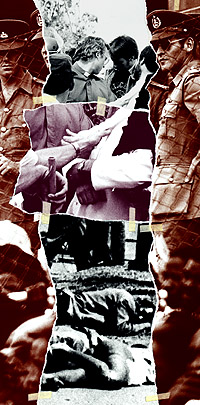
Moving clockwise from top left corner, the images are 1: South Africa, early 1980s (Salgado Junior); 2: South Africa, 1985: Priests detained by the police (Peter Tygesen/Danchurchaid); 3: South Africa, 21 March 1960: Sharpeville massacre (UPI).
One of the sections of the WCC's second assembly in Evanston in 1954 dealt with "The Church amid Racial and Ethnic Tensions".
An
Several months later the WCC invited some 80 white and black South African church leaders to meet with an international ecumenical delegation at Cottesloe College in the University of Witwatersrand.
The report of this meeting reaffirmed that no Christian may be excluded from any church on the grounds of race or colour. Almost immediately this was denounced by the South African government; and shortly thereafter the WCC's three South African Dutch Reformed churches withdrew from the Council.
Evanston's statement on race was unequivocal; yet it would be some time before the WCC pledged to join deeds to words in the struggle against racism:
offence
against
God
The strong terms in which the assembly spoke on this issue resonated particularly in South Africa, where racial tensions were increasing as a result of segregation established by apartheid laws. A mass killing by police of protesting black South Africans in Sharpeville in March 1960 heightened the attention of churches around the world to the evils of this system.
When we are given Christian insight, the whole pattern of racial discrimination is seen as an unutterable offence against God, to be endured no longer. In such moments we understand more fully the meaning of the gospel and the duty of both church and Christian.